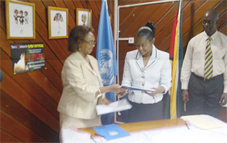The Ministry of Human Services and Social Security yesterday received US$75,000 ($15.4M) from the United Nations Development Programme (UNDP) for a project to help combat human trafficking by giving support to the victims and their families.
The project aims to strengthen the ongoing efforts of the ministry toward public awareness, training of focal points in the administrative regions, victim support and updating the directory of focal points in the administrative regions.
Minister Jennifer Webster, moments after a simple signing ceremony at the UNDP Brickdam office, told Stabroek News that she could not say how many victims and families were in need of support.

However, she said, the ministry is there to provide counselling services for all affected by this issue. In terms of the funding from the UNDP, she said the setting up of skills training programmes for some of the victims and educational opportunities so that they could be reintegrated into their communities are being looked at.
Webster told this newspaper that there is a special team which would travel to mining areas and other places where human trafficking is said to be rampant. She explained that there is a counter-trafficking department and this year the intention is to increase the number of staff. Additionally, she said the ministry has focal points in communities and the intention is to build more capacity through fostering relationships with NGOs.
Asked what measures are in place to protect the main witnesses (the victims) she responded that there are shelters in existence. She further explained that shelters are meant to be safe houses and are “not somewhere where you would hold someone against their will. So the media also needs to understand that. It is not meant to be a prison. It is to ensure that they are kept safely from the perpetrators.”
Commenting further on the recent case involving several teens who escaped an alleged prostitution ring at Itaballi, the minister said the girls did not run off from the shelter they were taken to but rather left of their own free will. She said officers from her ministry found them the following day and they are now back in the ministry’s care.
Earlier, during the signing ceremony, Webster told the small gathering that she was delighted at the initiative since it relates to an issue that is of concern across the world. UNDP’s stance to help the ministry in this fight is indeed a commendable one, she said.
She pledged to continue to collaborate with UNDP because “it is an issue that we in Guyana recognize that we would like to eliminate within our society”. She said while eliminating trafficking in persons completely might be difficult, her ministry was looking to decrease it.
She said the issue is one the population needs to be sensitized about adding that the victims are affected by the crime and the ministry has a right to provide safe conditions and accommodation, psychological support, medical and legal assistance as well as educational and training opportunities.
“We must all be our brothers and sisters’ keepers. We must all look out for each other. We must pay attention to what goes on in our communities and our surroundings,” she said adding that it is important that the relevant authorities are contacted when incidents of human trafficking are discovered.
Government has a task force, she said, which is chaired by Minister of Home Affairs Clement Rohee and that task force meets on a quarterly basis.
She said that out of this agreement, the ministry is aiming to strengthen public participation; trust and confidence with stakeholders as well as to promote greater awareness in the area of human trafficking.
Meanwhile, UNDP Resident Representative Khadija Musa said the project came about as a result of discussions with the team implementing Tackling Child Labour Through Education (Tackle) Project, and the Ministry of Human Services and Social Security.
She said the UNDP will collaborate with the ministry in strengthening its capacity to respond to issues related to Trafficking in Persons in Guyana noting that this issue is a major concern for all stakeholders not only in Guyana but also around the world. Young women, particularly from hinterland and vulnerable coastland communities are the most affected, she said
According Musa, a report on Guyana produced by the Office of the UN High Commissioner for Human Rights (OHCHR), which is dated June 11, 2011, states that “Guyana is a source and destination country for men, women, and children subjected to sex trafficking and forced labour. Guyanese nationals have also been subjected to forced prostitution and forced labour in other countries in the region.“
Identified cases of human trafficking within the country during this reporting period generally involved women and girls in forced prostitution, she added.
The report, according to the UN official, further states that the Government of Guyana is making significant efforts to comply with the minimum standards for the elimination of trafficking and there have been efforts on the part of officials, including mining officials, to rescue potential victims.
She said the project will be implemented in collaboration with key stakeholders including the mining and the NGO community. Describing human trafficking as “today’s slavery”, she encouraged all to look around and identify such.
Musa said too that children must be educated at home about human trafficking.
President of the Guyana Women’s Miners Organisation Simona Broomes said that the funding is timely. She said that from the time the organization was launched, among its focuses was the elimination of human trafficking. “We are happy that UNDP has come on board with funding to really support these victims and I hope it will bring change. It is all about eliminating and dealing with this situation.”
Tricia Watson, head of the counter-trafficking department outlined the legislation in place to deal with this issue.





